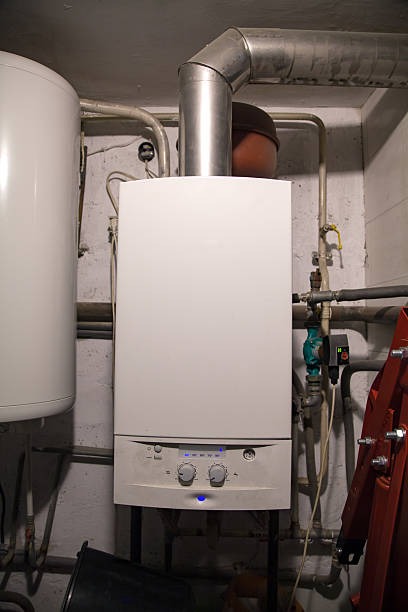

Water Heater Installation in West Chester, PA
Upgrading or replacing your water heater is a major home decision—especially in West Chester, PA where cold winters and older, historic homes place extra demand on hot water systems. Proper water heater installation protects your household from leaks, carbon monoxide risk, and inefficient operation.
Why professional installation matters in West Chester, PA
West Chester’s seasonal extremes and many older homes create specific installation challenges:
- Cold winter temperatures increase standby heat loss for traditional tank models and raise demand for recovery rates.
- Local building stock often includes tight basements, small utility closets, masonry chimneys, or limited access that affect venting and placement.
- Area water quality tends to be moderately hard, increasing sediment buildup and accelerating tank corrosion if not addressed.
Proper sizing, venting, and code-compliant connections are essential to keep equipment safe, efficient, and long-lasting.
Pre-install consultation and accurate sizing
A thorough pre-install consultation ensures you get the right unit for your household:
- Review of household hot water demand (number of occupants, peak usage times, appliances like dishwashers and laundry).
- Assessment of installation location, venting options, and available fuel type (natural gas, propane, or electric).
- Inspection for water quality issues (hardness, sediment) and space constraints (clearances, access).
- Recommendation of appropriate capacity or flow rate: typical tank sizes for West Chester homes range from 40 to 80 gallons; tankless systems are sized by gallons per minute (GPM) needed during peak use.
This step confirms the correct model and identifies any pre-install upgrades needed, such as improved venting, electrical service, or a new gas line.
Site preparation requirements
Preparing the installation site reduces delays and additional costs:
- Clear a path and working area around the existing heater; remove stored items from basements or closets.
- Provide access to electrical panels and gas shutoff valves.
- If the installation requires new venting through a roof or an exterior wall, ensure exterior access is available and any planned carpentry or finish work is identified.
- Address water quality concerns beforehand (consider a water softener or sediment filter if hard water is present).
Plumbing, gas, electrical connections and venting
Installation includes several coordinated trades and code-required steps:
- Plumbing: removal of the old unit, connection of cold and hot supply lines, installation of a temperature and pressure relief (TPR) valve, and proper drain connections.
- Gas: new or updated gas line sizing, leak testing, and a shutoff valve installed per code.
- Electrical: for electric or hybrid units, dedicated circuit wiring and proper breaker sizing are installed. Tankless electric models may require significant panel capacity.
- Venting: gas-fired water heaters require properly sized and routed vents. In older West Chester homes, chimney liners or direct-vent conversions may be necessary to meet modern combustion air and venting codes.
All connections should meet local Chester County and Pennsylvania plumbing and mechanical codes; many installations require a permit and a municipal inspection.
Code compliance, safety checks, and start-up testing
Code compliance and safety verification are central to a professional install:
- Permits and inspections: permit pulled when required; city or township inspection to verify venting, gas, and electrical work.
- Combustion safety: for gas units, combustion analysis and carbon monoxide checks ensure safe burner operation and proper draft.
- Leak and pressure tests: water and gas lines are pressure tested and checked for leaks.
- Start-up testing: thermostat function, recovery rate, and pilot/ignition tests for gas units. For tank systems, technicians document temperature and pressure valve operation.
- Documentation: installers should provide a startup checklist and registration information for manufacturer warranties.
Expected timeline and what to expect on install day
Typical timelines:
- Pre-install consultation and sizing: 1 visit, 30–60 minutes.
- Permit approvals (if required): a few days to a week depending on the municipality.
- Installation day: most standard tank replacements are completed in 3–6 hours. More complex installs (tankless, venting upgrades, electrical or gas line work) can take 1–2 days.Homeowner responsibilities on install day:
- Clear access to the work area and remove stored items.
- Ensure utility shutoff points are accessible.
- Provide any needed property access for exterior venting work.
- Plan for temporary hot water interruption during removal and start-up.
High-efficiency model options and brands for West Chester homes
Common high-efficiency choices that suit local needs:
- Heat pump (hybrid) water heaters: best for energy savings in moderate climates with space and electrical capacity.
- Condensing gas tankless systems: provide on-demand hot water with high efficiency—ideal where gas service is available and space is limited.
- High-efficiency storage tanks with enhanced insulation and lower standby losses.
Brands commonly recommended due to reliability and support include Amana, Rheem, Bradford White, AO Smith, Rinnai, Navien, and Bosch. Match the model to your fuel type, household demand, and installation constraints.
Warranty expectations
Manufacturer warranties vary by product:
- Conventional tank water heaters commonly carry 6 to 12 year limited tank warranties and shorter parts warranties.
- Tankless and hybrid models may have 5 to 15 year components warranties depending on brand and model.
- Installation labor warranties can differ; many installers offer a workmanship warranty for a limited period after installation.
Always register the new unit with the manufacturer and retain installation and startup documentation to preserve warranty coverage.
Recommended maintenance to prolong system life
Regular maintenance significantly extends service life and maintains efficiency:
- Annual flush for storage tanks to remove sediment (more often if water is hard).
- Inspect and test the TPR valve yearly.
- Replace sacrificial anode rods when corrosion is detected (a common cause of premature tank failure).
- Annual combustion and vent inspection for gas units.
- For tankless systems, descaling every 1–3 years depending on water hardness.
- Consider a whole-house water softener if hard water is confirmed.
Routine maintenance reduces the risk of emergency failures during West Chester’s winter months and improves long-term operating costs.


Enjoy flexible financing options that make upgrading or repairing your HVAC system easy and budget-friendly.









